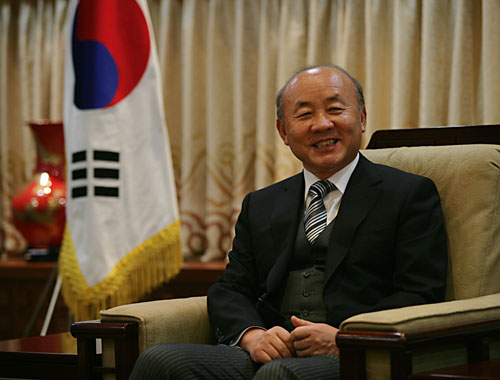Economy
Free trade talks 'likely next year'
By Lan Lan and Ding Qingfen (China Daily)
Updated: 2010-08-05 09:23
 |
Large Medium Small |
 |
|
Yu Woo-ik, the South Korean ambassador to China. [Photo / China Daily] |
China-South Korea pact to 'act as catalyst'
BEIJING - A top South Korean diplomat to China has said that China and South Korea are likely to launch negotiations on a free trade agreement (FTA) next year, a move Chinese analysts said will help reshape trade in East Asia.
Yu Woo-ik, South Korea's ambassador to China, told China Daily in an exclusive interview that the two Asian nations "are expected to initiate official FTA talks in 2011", after a four-year feasibility study among governments, industrial associations and academies from the two countries was wrapped up recently.
Japan, China and South Korea have the largest, second-largest and fourth-largest economies in Asia, accounting for about 70 percent of the Asian economy and 18.6 percent of the global economy.
The free trade zone, if established, will hold a consumer population of 1.5 billion. It will be the third-largest economic area in the world, only after the North American Free Trade Agreement and the European Union.
China has reached free trade deals with Pakistan, the Association of Southeast Asian Nations, Iceland, Chile, Peru, Costa Rica and New Zealand. It is also in talks with Australia and Mongolia over similar agreements.
Zhan Xiaohong, an analyst on China-South Korea issues from the Chinese Academy of Social Sciences, said progress on the China-South Korea FTA will act as a catalyst for East Asian trade.
Long Guoqiang, a top trade policy researcher in China with the Development Research Center of the State Council, which was involved in the feasibility study, said: "It is really worth anticipating and good news for both, especially for the South Korean economy."
The Ministry of Commerce did not comment on the FTA issue.
The Economic Cooperation Framework Agreement (ECFA) signed by the Chinese mainland and Taiwan in June also gave impetus to progress on the China-South Korea negotiations, analysts said. Under the ECFA, the Chinese mainland and Taiwan will remove tariffs on close to 1,000 categories of goods to each other.
The ECFA will stimulate South Korea to accelerate the process of the FTA negotiations with Chinese mainland, as Taiwan is a major competitor with South Korea in areas such as electronics and chemicals, according to Nomura International.
The trade agreement across the Taiwan Straits will also threaten exporters from South Korea, which have relied much on the Chinese market, analysts said.
Yu admitted that South Korea has "a bit of concern" over the ECFA. He also said that the ECFA could enhance cross-Straits economic cooperation.
From the long-term perspective, China and South Korea should sign an FTA "to avoid unfair trade cooperation", Yu said.
China is South Korea's largest trade partner, followed by the United States. Last year, China-South Korea trade accounted for 21 percent of South Korea's foreign trade.
| ||||
Still, official negotiations cannot start as China and South Korea stakeholders have concerns over the implementation of the FTA.
In South Korea, industrial groups from the agriculture, forestry and fishing sectors are deeply concerned that the local industries will be hurt when the market is open to each other under the FTA framework, Yu said.
But Long Guoqiang from the Development Research Center of the State Council said the FTA will still help South Korea take advantage of the high growth of the Chinese economy.


